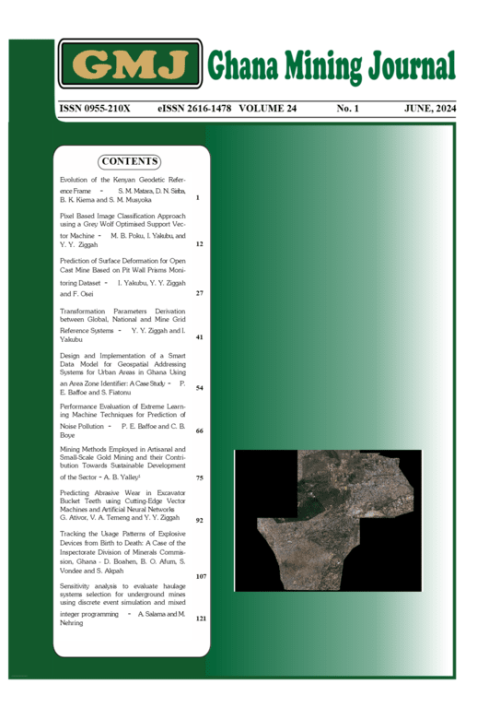Main Article Content
Conversion of End-of-Life Vehicle Tyres as Chemical Feedstock for the Production of Diesel Range Liquid Fuel and Char*
Abstract
Globally, over 780 billion plastics are used and discarded annually, with no proven avenues for value recovery. End-of-life vehicle tyres from the mining industry which cannot be re-used are burnt (as a disposal method) at isolated areas by scrap dealers and steel wires retrieved for sale to the iron and steel making industry. The huge amounts of gaseous pollutants released into the atmosphere as a result promote greenhouse effect and global warming. The focus of this research was investigating the feasibility of creating a diesel-compatible liquid fuel and char from end-of-life vehicle tyres (EVTs) using a temperature range of 300 °C – 670 °C from a charred palm kernel shell-fired reactor-blower assembly as a sustainable method of disposing EVTs. Samples of EVTs were collected from Tarkwa Municipality in the Western Region of Ghana and were shredded and dried in the open. Approximately 2 kg of samples of the shredded EVTs were introduced into a stainless-steel reactor and subjected to pyrolysis for 55 minutes at a heating rate of 40 °C/min. The gas exiting the reactor was collected, cooled and liquefied in a plastic container, after which its mass was measured, and its properties were analyzed by FT-IR and GC-MS. The findings show that diesel-range liquid fuel (density 0.936 g/cm3) can be generated with a yield of approximately 0.33 – 0.40 litres/kg from EVTs. Results from FT-IR and GC-MS analyses revealed that the liquid fuel is primarily composed of aromatic hydrocarbons, specifically alkyl benzenes, as well as aliphatic hydrocarbons and minor amounts of naphthenes. SEM-EDS analysis of the chars revealed partly carbonaceous material (67.18 ~ 86.67 wt.% C) that could burn to yield an ash rich in CaO, ZnO and TiO2. It was concluded that the feasibility of end-of-life vehicle tyres pyrolysis offers a viable solution to end-of-life vehicle tyres disposal challenges faced by the mining industry and Ghana.






